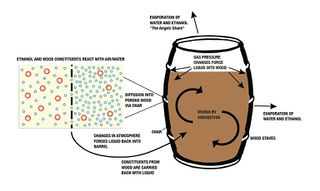Wood aging: Difference between revisions
Jump to navigation
Jump to search
Uncle Jesse (talk | contribs) Adding image |
Uncle Jesse (talk | contribs) m Minor edits |
||
| Line 1: | Line 1: | ||
[[File:Barrel-aging-science-cut-away.jpg|thumb|320px|right|Barrel Aging illustration]] | [[File:Barrel-aging-science-cut-away.jpg|thumb|320px|right|Barrel Aging illustration]] | ||
This is the process of [[Maturation|maturing]] [[ | This is the process of [[Maturation|maturing]] [[wine]] or [[spirits]] in [[Oak_barrel|barrels]] or [[cask]]s prior to [[bottling]]. This process allows young beverages to soften and absorb some of the wood's flavors and [[tannin]]s and allows the flavors to become concentrated through slight [[Angel's_share|evaporation]] through the wood. While oak is the overwhelming wood of choice for wood aging, mesquite, hickory, pecan, apple, orange, and cherry wood can also contribute unique qualities to wines or spirits aged with their chips or shavings. The taste a wood tends to impart in wine is that of its smell. | ||
See also [[Maturation | See also: [[Maturation]]. | ||
[[Category:Glossary]] | [[Category:Glossary]] | ||
Latest revision as of 10:50, 8 October 2017

This is the process of maturing wine or spirits in barrels or casks prior to bottling. This process allows young beverages to soften and absorb some of the wood's flavors and tannins and allows the flavors to become concentrated through slight evaporation through the wood. While oak is the overwhelming wood of choice for wood aging, mesquite, hickory, pecan, apple, orange, and cherry wood can also contribute unique qualities to wines or spirits aged with their chips or shavings. The taste a wood tends to impart in wine is that of its smell.
See also: Maturation.